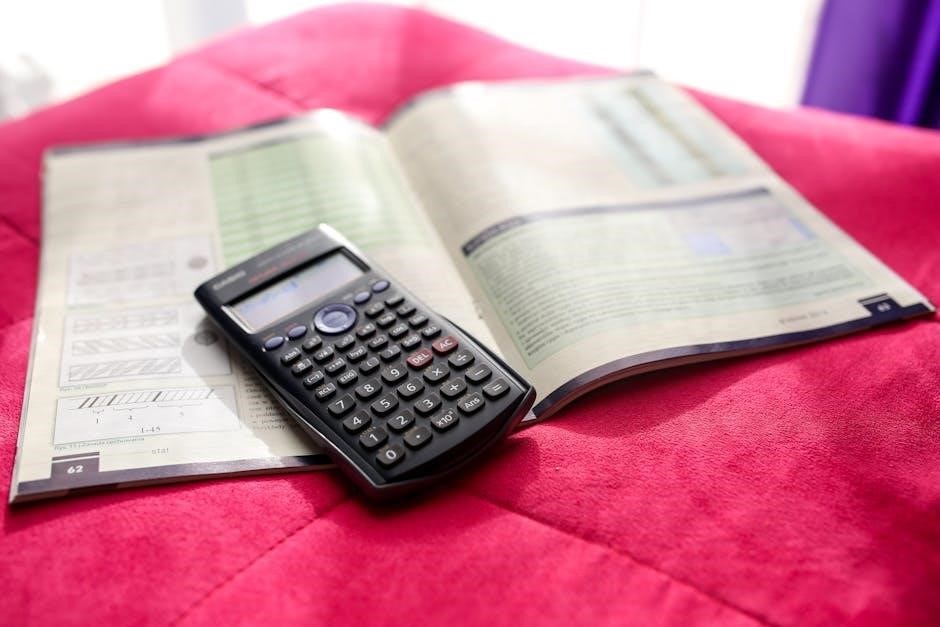edexcel gcse maths revision guide

The Edexcel GCSE Maths revision guide provides a comprehensive approach to mastering key topics, offering structured revision strategies, practice papers, and expert tips for exam success.
It emphasizes understanding the exam structure and effective techniques to tackle challenging questions, ensuring students are well-prepared for their Edexcel GCSE Maths examinations.
1.1 Importance of Structured Revision
Structured revision is crucial for Edexcel GCSE Maths as it ensures a clear focus on key topics, helping students manage time effectively and reduce exam anxiety. A well-planned approach allows for systematic coverage of the syllabus, ensuring no important areas are overlooked.
Regular practice and review of concepts build confidence and improve retention, enabling students to tackle challenging questions with ease and precision during exams.
1.2 Understanding the Edexcel Exam Structure
The Edexcel GCSE Maths exam consists of two papers, each worth 80 marks and lasting 1 hour 30 minutes. Questions cover a range of topics, including number, algebra, geometry, and data handling. Understanding the exam structure helps students prioritize revision and manage time effectively during the actual test.
Recognizing the distribution of question types and difficulty levels ensures a focused approach to practice, boosting confidence and performance in the exam.

Key Topics Covered in Edexcel GCSE Maths
Edexcel GCSE Maths covers essential topics such as number, algebra, geometry, and data handling. These areas form the foundation for problem-solving and practical applications in the exam.
2.1 Number and Algebra
Number and algebra are core components of Edexcel GCSE Maths, focusing on operations, fractions, equations, and sequences. Mastering these topics is crucial for solving problems across various mathematical disciplines. Students should practice manipulating algebraic expressions and solving linear and quadratic equations to build a strong foundation. Utilizing revision guides and past papers can enhance understanding and fluency in these areas.
- Key areas include fractions, decimals, and percentages.
- Algebraic skills involve simplifying expressions and solving equations.
- Sequences and series are also emphasized for logical reasoning.
2.2 Geometry and Measurement
Geometry and measurement are fundamental areas in Edexcel GCSE Maths, covering properties of shapes, area, volume, and trigonometry. Students should focus on calculating perimeter, area, and volume of various shapes, as well as applying Pythagoras’ theorem and trigonometric ratios. Practical applications and past paper questions can reinforce these concepts effectively.
- Mastery of shape properties and spatial awareness is essential.
- Calculating area and volume requires precise formula application.
- Trigonometry involves understanding angles and side relationships in triangles.
2.3 Data Handling and Probability
Data handling and probability involve interpreting and analyzing data, including graphs, charts, and tables. Students should practice calculating probabilities, understanding statistical measures, and applying concepts like Venn diagrams and tree diagrams. Mastery of these skills is crucial for solving real-world problems and achieving success in Edexcel GCSE Maths exams.
- Focus on interpreting graphs and charts accurately.
- Understand probability rules and their applications.
- Practice statistical measures like mean, median, and range.

Effective Revision Strategies
Effective revision strategies for Edexcel GCSE Maths involve active learning, consistent practice, and understanding core concepts. Prioritize problem-solving, use past papers for exam practice, and review mistakes to improve.
- Engage with interactive tools for better retention.
- Set clear goals for each revision session.
- Use flashcards for quick formula recall.
3.1 Creating a Revision Timetable
Design a structured revision timetable to organize your study schedule effectively for Edexcel GCSE Maths. Allocate specific time slots for each topic, focusing more on weaker areas like Geometry. Plan weekly goals, ensuring balance and flexibility. Incorporate practice exams every four weeks to adapt to the exam format. Utilize active learning techniques, such as flashcards for formulas, and include review sessions to reinforce learning. Schedule buffer days for unexpected tasks and use teaching concepts to others as a reinforcement strategy. Ensure access to necessary resources like past papers and revision guides. Track progress weekly and adjust the timetable to address challenging topics, maintaining realistic expectations to avoid burnout and stay motivated throughout the preparation journey.
3.2 Active Learning Techniques
Engage in active learning by teaching concepts to others, using flashcards for key formulas, and incorporating interactive tools. Regular practice exams help apply these techniques in real exam conditions, enhancing understanding and readiness for the Edexcel GCSE Maths exam.
3.3 Using Flashcards for Key Formulas
Flashcards are an excellent tool for memorizing key formulas in Edexcel GCSE Maths. Write formulas on one side and their explanations or applications on the other. Regularly reviewing them helps reinforce memory and ensures quick recall during exams. They are portable, making them ideal for on-the-go revision and self-assessment.

Recommended Resources for Edexcel GCSE Maths
Essential resources include CGP revision guides, past exam papers, and online platforms like ExamSolutions.net. These tools provide comprehensive coverage, practice questions, and expert explanations to support effective revision and exam preparation.
4.1 CGP Revision Guide
The CGP Revision Guide offers concise, student-friendly explanations of every topic, backed by detailed notes and plenty of practice questions. It covers the entire Edexcel GCSE Maths curriculum, ensuring comprehensive preparation for exams with clear and accessible content tailored to meet student needs effectively.
4.2 Past Exam Papers and Mark Schemes
Past exam papers and mark schemes are essential resources for Edexcel GCSE Maths revision. They provide real exam questions, allowing students to practice under timed conditions and familiarize themselves with question formats. Mark schemes offer detailed explanations, helping students understand common errors and improve their answers effectively for better exam performance.
4.3 Online Platforms for Practice
Online platforms like ExamSolutions.net offer video tutorials, interactive exercises, and practice questions tailored to Edexcel GCSE Maths. They provide detailed explanations and cover a range of topics, helping students identify weaknesses and improve their understanding. These resources are ideal for supplementary practice and enhancing exam technique effectively.

Exam Practice and Past Papers
Practicing with past papers helps students identify weaknesses, improve time management, and master exam techniques. Regular practice builds confidence and ensures thorough preparation for the Edexcel GCSE Maths exam.
5.1 Benefits of Practicing Past Papers
Practicing past papers helps students familiarize themselves with exam formats, question types, and time constraints. It improves problem-solving skills, highlights weak areas, and boosts confidence, enabling effective preparation for the Edexcel GCSE Maths exam.
5.2 Analyzing Common Question Types
Identifying common question types helps students understand recurring themes and patterns in Edexcel GCSE Maths exams. By analyzing past papers, learners can recognize frequently tested topics and improve their ability to tackle similar problems confidently and efficiently during the exam.
5.3 Improving Exam Technique
Mastering exam technique involves effective time management, careful reading of questions, and applying learned strategies. Students should practice answering different question types under timed conditions to build confidence and accuracy, ensuring they maximize their marks in the Edexcel GCSE Maths exam.

Common Challenges and Solutions
Students often struggle with difficult topics, exam anxiety, and time management. Solutions include seeking support, practicing past papers, and using revision guides to build confidence and understanding.
6.1 Overcoming Difficult Topics
Identify challenging areas like algebra or geometry and break them into smaller, manageable parts. Use CGP guides and past papers for targeted practice. Apply active learning techniques, such as solving problems step-by-step, to build confidence and understanding. Flashcards can also help reinforce key formulas and concepts effectively.
Regularly review mistakes to pinpoint weaknesses and focus on improvement. Consistent practice and seeking clarification from teachers or online resources can make complex topics more accessible over time.
6.2 Managing Exam Anxiety
Exam anxiety can hinder performance. Practice deep breathing and stay hydrated to calm nerves. Positive visualization and regular breaks during revision can reduce stress. Familiarize yourself with the exam format using past papers to build confidence and reduce uncertainty.
Stay organized, ensure adequate sleep, and maintain a healthy diet. Use relaxation techniques and remind yourself of your preparation. Seeking support from teachers or peers can also help alleviate anxiety and improve focus during exams.
6.3 Seeking Additional Support
Seeking additional support is crucial for overcoming challenges. Utilize revision guides, online platforms, and past papers for targeted practice. Reach out to teachers or classmates for clarification on difficult topics. Join online forums or study groups for peer support. Time management and guidance from mentors can also enhance your revision effectiveness.
Stay positive and focused, knowing that seeking help is a proactive step toward success. Engaging with available resources and support networks can significantly improve understanding and confidence in Edexcel GCSE Maths.

Utilizing Online Resources
Online resources offer a wealth of tools for Edexcel GCSE Maths revision, including video tutorials, interactive exercises, and online communities for peer support and guidance.
7.1 Recommended Websites for Maths Revision
Recommended websites like ExamSolutions.net and CGP Revision Guide websites offer video tutorials, practice questions, and detailed explanations tailored for Edexcel GCSE Maths. These resources provide interactive tools, past papers, and student-friendly guides to enhance understanding and exam preparation effectively.
7.2 Video Tutorials and Interactive Tools
Video tutorials from platforms like ExamSolutions.net provide step-by-step explanations for complex topics, while interactive tools offer real-time feedback and practice exercises. These resources help students visualize problems, improve problem-solving skills, and reinforce key concepts through engaging and dynamic learning experiences tailored for Edexcel GCSE Maths revision.
7.4 Online Communities for Peer Support
Online communities like Reddit and student forums provide valuable peer support for Edexcel GCSE Maths revision. Students can discuss challenging topics, share resources, and collaborate on problem-solving, fostering a collaborative learning environment that complements individual study and exam preparation effectively.

Time Management and Exam Technique
Effective time management and exam techniques are crucial for Edexcel GCSE Maths success. Allocate time wisely per question, prioritize high-mark questions, and review answers to maximize scores.
8.1 Allocating Time Effectively During Exams
Allocating time effectively during Edexcel GCSE Maths exams ensures optimal performance. Divide time equally per question, focusing on higher-weight questions first to secure maximum marks. Practice past papers to refine pacing and avoid rushing, ensuring thorough answers and minimizing errors during the exam.
8.2 Strategies for Tackling Different Question Types
Practice past papers to identify common question types and patterns. For multiple-choice questions, read carefully and eliminate wrong answers. For word problems, break them into smaller steps. For proofs or long questions, plan your approach and structure your answer clearly. Use CGP guides and online resources for targeted practice and improvement.
8.3 Reviewing and Refining Answers
After answering questions, allocate time to review your work. Check for calculation errors, ensure all steps are clear, and verify that answers address the question fully. Use mark schemes or sample answers to compare and refine your responses, improving accuracy and presentation. This step is crucial for maximizing marks in exams.

Final Revision Tips
Stay calm, review key concepts, and ensure adequate rest and nutrition. Final checks on formulas and common pitfalls can significantly boost confidence and performance in exams.
9.1 Staying Calm and Focused
Staying calm and focused during revision is crucial. Practice relaxation techniques like deep breathing or mindfulness to manage stress. A clear mind enhances concentration, allowing you to absorb information more effectively and retain it for exams. Regular breaks can also prevent burnout and maintain productivity throughout your study sessions.
9.2 Last-Minute Review of Key Concepts
Conducting a last-minute review of key concepts ensures retention of critical information. Focus on high-weight topics and frequently tested areas. Use flashcards or concise notes to quickly recap essential formulas, theorems, and definitions. This approach helps reinforce memory and builds confidence just before the exam, ensuring you’re well-prepared for any question.
9.3 Ensuring Adequate Rest and Nutrition
Adequate rest and nutrition are crucial for maintaining focus and cognitive function during revision. Ensure 7-9 hours of sleep nightly and consume a balanced diet rich in fruits, vegetables, and whole grains. Stay hydrated and avoid excessive caffeine or sugary snacks to maintain energy levels and mental clarity throughout your study period.
Consistent practice and structured revision are key to excelling in Edexcel GCSE Maths. Stay focused, utilize quality resources, and maintain a positive mindset for success in your exams.
10.1 Summarizing Key Revision Points
Effective revision involves consistent practice, structured timetables, and active learning techniques. Utilize past papers, flashcards, and recommended resources like CGP guides for targeted preparation. Focus on understanding exam structures, common question types, and time management strategies to build confidence and achieve success in Edexcel GCSE Maths.
10.2 Encouragement for Continued Practice
Consistent practice is key to mastering Edexcel GCSE Maths. Regularly using revision guides, online platforms, and past papers will enhance your understanding and confidence. Celebrate small progress, stay motivated, and remember, every practice session brings you closer to achieving your goals in the exams.
10.3 Final Motivation for Exam Success
Stay calm, focused, and confident as exam day approaches. Trust in your preparation and remember that consistent effort leads to success. Visualize your goals, maintain a positive mindset, and approach each question with clarity. You’ve worked hard—now is your time to shine and achieve your full potential.
Leave a Reply
You must be logged in to post a comment.